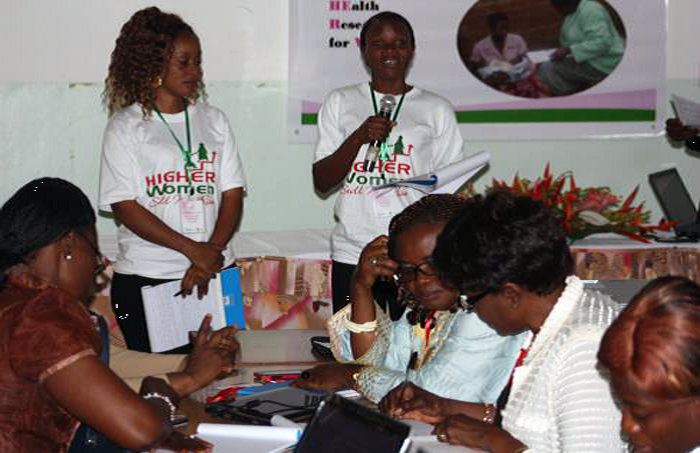Problem
Early-career women scientists in Cameroon face numerous challenges in establishing their careers, including a lack of mentors and role models, a lack of research and proposal development skills, inadequate capacity for fundraising and a lack of networking opportunities.
Proposed solution
To address these challenges, women health researchers came together in 2015 to form the Higher Institute for Growth in Health Research for Women (HIGHER Women). The Cameroon-based consortium is designed to provide the country’s early-career women scientists with the mentoring, skills development and career planning they need to establish an enduring presence in the field of health research.
Background
Situated in Central Africa, Cameroon shares its northeastern border with Chad, its eastern border with the Central African Republic, its southern border with Congo, Equatorial Guinea and Gabon, and its western border with Nigeria. A lower middle-income country with a population of 23 million, Cameroon is divided into Francophone and Anglophone-speaking regions. While Cameroon has long enjoyed political stability, recent years have seen a spate of attacks by the insurgent group, Boko Haram, in the country’s increasingly volatile northeast.
Workshop session
Cameroon boasts a history of promoting research, with a strong record of scientific publishing record and a large number of researchers. However, only a small number of women scientists in Cameroon – 22% as of 2008 - engage in research, according to the 2015 UNESCO Institute for Statistics. Not only are women scientists in Cameroon underrepresented in health research, they also occupy few leadership positions or decision-making roles. According to Cameroon’s Ministry of Higher Education, only 7% of the country’s full professors are women.
Gender disparities are also evident in the lower rates of enrolment in education, with female students far behind their male counterparts. At the secondary level, for instance, female enrolment is 46% compared to 54% male enrolment, and at the tertiary level, female enrolment is only 10%, according to the 2015 UNESCO Institute for Statistics.

Increasingly, efforts are being made to promote women’s participation in science. Cameroon’s Ministry of Higher Education has implemented a quota for hiring women scientists as university lecturers. The ministry also provides assistance to young women who enroll in science and technical studies, including scholarships for young women who excel in science. At the same time, professional networks and associations in Cameroon such as the Cameroon Women in Science and Technology (CWST), Women Scientists of Cameroon (FESCICA) and Plan International are promoting women and girls’ involvement in science.
What was done
HIGHER Women provided professional support, mentoring and networking opportunities to a cadre of young women scientists to enable them to undertake health research and contribute to addressing infectious diseases in Cameroon. While 25 early-career women scientists were targeted, the consortium received funding from Canada’s International Development Research Centre (IDRC) to support an additional 27 women scientists.
A mentor-protégé programme partnered 17 mentors, representing 18 research institutions and universities across Cameroon, with 52 protégés with less than 5 years of experience. Pairs were tailored to the protégés’ needs and professional interests.
A 5-day workshop provided training in grant writing, proposal development and research fundamentals, including study design, research ethics and intellectual property. In addition, the workshop served as an important venue to facilitate and promote networking among the early-career and established women scientists.
Impact
Ten early-career women scientists have developed grant proposals. Initially comprising just a few individuals, the consortium received a great deal of attention in the media, prompting other established women scientists working in academia, research institutes and government institutions to join their ranks. The original 50 protégés are expected to transition to the researcher within 5 years, and to “pay it forward” by becoming mentors to future early-career women scientists.
HIGHER Women has established a website to facilitate networking, information sharing and advocacy for women researchers. An article documenting the consortium’s efforts to support early-career women scientists is being developed for publication.
With support from several ministries, including the Ministry of Higher Education, the Ministry of Women’s Empowerment and the Family and the Ministry of Scientific Research and Innovation, all of which are represented in the consortium, HIGHER Women is being formalized and launched as a national network with country-wide membership, and a platform to bring together women scientists. HIGHER Women also plans to establish a research centre where quality research can be undertaken and whose premises can be used for training workshops, thereby raising the profile of health research.
Contact: Professor Rose Leke.

